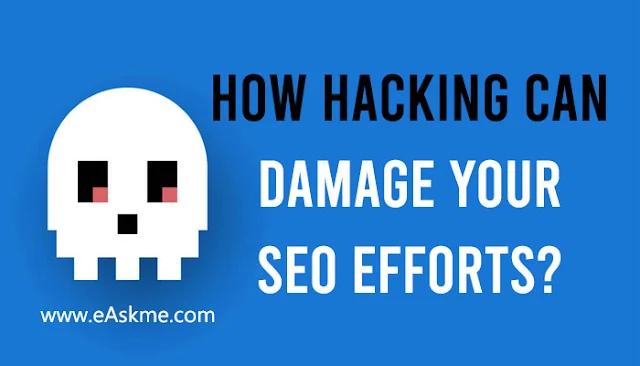The absence of website security will put your data at risk, and anyone can damage your code, content and live performance.
 |
| How Hacking Can Damage Your SEO Efforts: eAskme |
Other people are reading: 10 Ways Hackers Crack Complicated Passwords
You should be serious about your website or blog security to implement digital marketing strategies securely.
To prevent SEO damage because of the hacking, you need to understand what is hacking and how it can damage SEO efforts.
What is Hacking?
Hacking happens when someone can access your website or blog without permission.Unauthorized hacking give hackers access to your private information, and they can not only alter your website but can destroy it.
To perform hacking, Hackers use various methods or tools.
Standard methods or Tools used by Hackers:
Malware:
Hackers create malwares to perform malicious activities. They can use malwares to disable your network connection or even steam information.Malwares can cause financial loss, identity theft, etc.
Spamming:
Spamming is one of the most commonly used tricks by hackers. In this method, hackers make the user visit the link created by the hacker.By adding spammy links to hacker’s website on your website, hackers steal all the traffic you might be getting.
What are the effects of hacking?
Spam:
SEO spam can cause significant damage to an established blog or website. The big reason why hackers hack a website is to perform SEO spam.When hackers hack an authoritative website, he can completely change the site into a link farm.
This can cause your visitors to open websites they are not intended to visit. Most of the times, hackers add malicious or phishing links.
SQL injection can make it impossible to recover the damage.
Malicious codes:
Malicious codes can harm not only your organic ranking but also search engines can put your website into the sandbox.Users even get notifications when they click on a malicious link on your website.
This will not only damage your website reputation but also make the visitor stay away from your site.
If the search engine finds many malicious links, then it can altogether remove your website from SERP.
Malicious codes can massively affect your SEO value:
- Traffic: Organic traffic will drop.
- Drop-in Engagement: User engagement on your website will drop. Bounce rate will increase, time on site will fall, and pages per sessions also decrease.
- Lack of trust: Visitors do not trust the site with a lot of security issues.
Malicious redirects:
Hackers usually add too many redirects to a hacked website.These redirects will make users land of different websites, and this will cause a drop in traffic.
Most of the times, these redirects will open a site with:
- Malicious codes or duplicate content.
- Spammy or phishing sites
Backlinks:
Every search engine analyze your backlinks and the sites you are linking to.Hackers add low-value links to a malicious website that can dramatically hurt your SEO efforts.
When you website attracts tons of backlinks from low-quality sites, then it will inevitably cause loss of organic traffic.
Blacklisting:
The site that has severe issues, such as too many redirects, malicious codes and spammy links will be downgraded in SERP.If the issues continue, then search engines can blacklist your website.
Even if your website is not flagged still a site with malwares can never rank higher in search results.
Risks and Prevention:
Installing plugins from Untrstued sources:
People love to use free plugins. You can quickly get tons of free plugins from WordPress.It is always a good idea to install plugins only from trusted sources.
Installing plugins from the sites with low brand value or new sites can put your website into danger.
The chances are that either these plugins are not secure or vulnerable.
Not updating the plugins:
The most common reason why most of the WordPress website get hacked is that the webmasters are not updating the plugins.Hackers can easily break the site with outdated plugins.
To be on the safe side, you must always update all the plugins.
Shared Hosting:
Shared hosting is quite popular because it is the cheapest type of hosting. But there are security issues with such servers.One shared server can be used to host 100’s of website, and some of them can be malicious.
If one site puts security risk to the server, then all the sites on that server will face the same danger.
Final Words:
Web security is essential not only for users but also for the webmasters or businesses. If you are working with clients, then you should also make them aware of website security.As a professional SEO expert, it is your job also to keep an eye on the website security and find ways to protect the website.
If you find this article interesting, don’t forget to share it with your friends and family.
Why?
Because, Sharing is Caring!
Don't forget to like us FB and join the eAskme newsletter to stay tuned with us.
You May Also Like these Guides;












